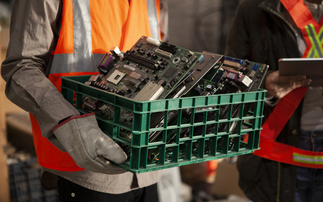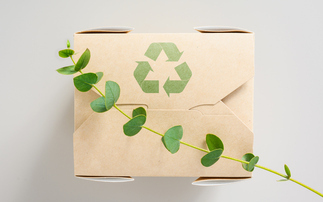The Dutch denim company wants to take the most popular fashion product in the world - a pair of jeans - and make it in the most sustainable way possible
MUD Jeans became famous for the pioneering the idea of leasing jeans rather than selling them. But a host of other innovations mean that the Dutch company is setting trends in other areas of sustainable production and consumption as it looks to cement its position as a leader in the pursuit of Sustainable Development Goal 12.
The company's jeans are designed to be recycled, with every last detail thought through to enhance recyclability, even down to using fabric patches for branding rather than the leather typically featured on a standard pair of jeans. Customers have the option to buy or lease the jeans, paying a monthly fee for 12 months, after which they can choose to swap them for a new pair. The leasing option is popular, with 50 per cent of online orders coming through this side of the business.
The company also offers a repair service, and collects jeans that are no longer wanted for recycling, including those from other brands. Last year, MUD Jeans produced 25,000 pairs of jeans, and 3,200 pairs were returned for recycling, double the number in 2017.
Thanks to this collection service, MUD's new jeans contained 23 per cent recycled denim last year. Its ambition is to reach 100 per cent by combining chemical and mechanical recycling. "It's very difficult to get to 100 per cent recycled jeans, but hopefully not impossible," explains Dion Vijgeboom, co-owner and operations manager of the company.
The company is small, employing just 11 people. Its supply chain is also very narrow, with all denim produced by one fabric mill in Spain, while a single factory in Tunisia manufactures the jeans. The size of the supply chain matches the company's ethos, says Vijgeboom.
"To split the cake over several suppliers just makes it harder when you're small," he explains. "In the beginning it was a necessity from that point of view. But when we started the process of taking back old jeans and recycling them into new jeans, it became clear that it matched our business model to have as few suppliers as possible."
Distributing old jeans to several shredders and yarn makers would make the process less transparent, and standards harder to maintain, Vijgeboom continues.
The company's sole focus on jeans is also very conscious, he says, as it simplifies management of the supply chain. "We're able to go in-depth and find each link in the chain," he says. "We can really focus on what we're doing with that one supplier."
The brand's example is influencing some of its retailers, who have asked MUD whether they can use its web portal to offer leases on the jeans themselves while others want to develop their own platform.
MUD is currently considering the best way of expanding the business model, as it is much more complicated in terms of administration and finance than traditional sales, according to Vijgeboom. The established model is that the manufacturer sells to the retailer at a wholesale price, followed by the retailer selling to the customer at the retail price, he explains.
"If you're going to split the payments, who's going to receive them? And who administers it, where does the profit go?" he asks.
Following MUD's model would be not an option for all companies, as it has been very expensive to set up, Vijgeboom says. The company has been lucky to work with many partners who have supported it financially to develop new techniques, he says. "Having the right network, together with our small scale has allowed us to be flexible and do a lot of trials, including the errors that come with that," he says.
But there is growing interest in lease models right across the fashion industry, as big brands battle with the dilemma of how to shift away from disposable and environmentally damaging 'fast fashion' strategies without obliterating their revenues.
Meanwhile, MUD not only wants to produce its jeans sustainably, it wants its customers to see how it does so. The team has been on two tours of its production facilities in Spain and Tunisia. It documented the tours on social media, and allowed customers to send in questions directly to factory workers.
Consumers were intrigued, Vijgeboom says. "Many people said that they were not aware of the complexity and all the people and processes that are behind one garment, and they are interested to learn more," he reflects. "Customers like the transparency, and it increases our credibility when we show the people behind the garment."
Again, the move sets an example to other companies, with some of the jeans' retailers asking to join the next tour. "That will be the next stage, to bring along some of the key retailers so they can see it at first hand," Vijgeboom says. "But we need to consider the impact of going to Tunisia, especially to fly there."
But despite all these green innovations, how can a fashion company wedded to selling products develop a truly sustainable production and consumption model as it scales?
Vijgeboom has a controversial, but potentially revolutionary answer. The sky is not the limit for MUD in terms of business growth, as the company wants to set a maximum production level. This has yet to be defined, Vijgeboom explains, but it would likely be between 200,000 and 400,000 pairs of jeans a year, he predicts. "We definitely want to define that optimum number, it's very conscious," he says. Perhaps small is not just beautiful, but sustainable too.






